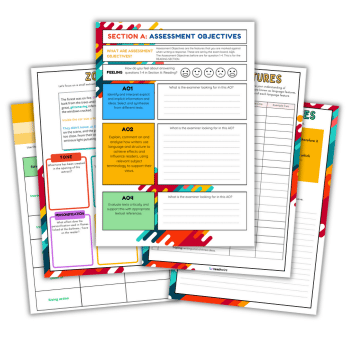Literacy is a team effort – Why everyone is a teacher of reading

A school’s English department will be the first line of response when it comes to raising students’ literacy levels, says Jayn Sadler – but teaching staff in other subjects have a crucial part to play as well…

- by Jayn Sadler
- English teacher based in north Essex

One of the biggest pushes in literacy we’ve seen over the last couple of years is in reading not just for purpose and pleasure, but also the promotion of successful, whole-school reading.
Teachers up and down the country have been sent on courses designed to help address reading demands across the secondary school environment. Lots of fantastic ideas have been shared throughout the teaching community, making for a collaborative approach to ‘reading’ that in lots of ways has been a great success.
Many teachers now possess the tools necessary to engage and encourage reading amongst young people, no matter which faculty they belong to.
Ambling through
And yet, whilst I’d love to confirm that reading amongst young people has shot up dramatically, giving rise to a whole new generation of comparatively advanced readers, that sadly isn’t the case.
On the contrary, promoting the cause of reading within schools can still feel like an uphill, almost unwinnable battle.
Of course, it hardly helps that we’re all increasingly concerned with how much ‘reading’ – of books, specifically – has been cast aside in favour of other 21st-century pastimes, such as social media, round-the-clock television and gaming.
In my honest opinion, though, as both an educator and a mother, the main problem we face with respect to reading stems mostly from the younger generation’s propensity to seek immediate gratification.
The act of reading a novel simply can’t compete in this rea, at a time when the modern world is so drenched in technology – but then it was never meant to.
It’s still the case that some of our more proficient students can read a book within a day, while most will amble through a book over the course of a couple of weeks, or perhaps longer.
It appears that reading books simply takes too long these days, since the transfer of information from the world to individuals, and from one individual to another – can now be conducted at breakneck speed, thanks to the internet and digital platforms (both of which only serve to exacerbate those cravings for immediate gratification even further).
An uplift of reading
There may be no hard and fast answers to the challenges of how to engage students with reading, but as educators we do need to be at the cutting edge of the latest strategies for addressing engagement with reading wherever possible.
We also need to make sure that every department within the school community can play its part in a general ‘uplift’ of enthusiasm for reading.
Far from being the sole preserve of English departments, responsibility for encouraging engagement with reading and widening access to literacy should rest with everybody, regardless the subject they teach.
What, then, are some ‘quick wins’ that teachers of other subjects can secure when it comes to enhancing students’ reading skills?
Terminology booklets Every department can contribute to the production of regularly updated ‘Subject terminology’ booklets that incorporate all the specialist terms students will need to know for every subject.
Trending
These could be issued to students upon starting at the school or when entering a specific year group, and potentially be updated annually. There may be time and cost considerations involved, but if possible, it should be a physical document, rather than an electronic publication that lives online.
This might seem like an old-fashioned reversion to the slow, pre-digital era,, but having the booklets exist in physical form will allow students to freely browse through them and cross- reference terminology from across all faculties, helping them build on and widen their vocabulary in a flexible and straightforward way.
Word etymology
Investigating a word’s etymology, by borrowing the approach shared by palaeontologists, historians and archaeologists, can be a great way of uncovering a word’s true meaning and/or derivatives. Getting students to play around with the etymology and morphology of subject-specific terms can form the basis of great starter activities. Ask students to apply common prefixes and suffixes, or experiment with nouns, adjectives and adverbs, in order to help them expand their vocabulary.
Ongoing professional development
All teachers should be trained in how to deliver reading skills. It really is that simple. Every teacher needs to understand the common barriers that can inhibit students’ ability to read, and how to overcome these. As an English teacher myself, the teaching of reading skills is my professional bread-and- butter. At the same time, I’ve learned to never underestimate just how little some teachers in other fields know about the effective teaching of spelling, grammar and punctuation!
That’s perhaps inevitable, given the fierce passion that many teachers have for their subject, to the exclusion of everything else (rare is the dedicated maths genius who also takes a close interest in the wonderful comma). Yet it remains the case that the issues we currently face around reading demand a more holistic, joined-up approach, due to an evolution of what’s needed, in terms of general teaching and learning.
Any in-school literacy training programmes for staff should be written and implemented by those in charge of teaching and learning, and delivered regularly to ensure that the issue of whole- school literacy doesn’t fall off the radar.
It always amazes me to see how many fantastic initiatives simply wither and die after their initial introduction, due to the various highly pressurised daily demands that come with the job.
Reading weeks
These can work extremely well, given sufficient implementation time and buy-in from colleagues. Schools could introduce competitions around reading and vocabulary work, and set aside a designated week (or even month) for school-wide, reading-related activities, communicated via consistent messaging and branding.
Those activities could, for instance, include a ‘Shakespeare soliloquy’ competition, ‘science versus religion’ debating competitions, marking the week with a specially produced departmental student newsletter, a student contest modelled on Countdown, or even a ‘Word Fayre’ – where students gain digital credits for using certain vocabulary in class or in their written work, which they then get to spend at a Fayre held at the school, exchanging their credits for selected items and gifts.
In-subject, guided reading
Finally, teachers in every subject should read to students, read together with students, or have students echo the reading. Many do this already, of course, but a fair few don’t. It’s always important to remind teachers that reading to, and with children is the quickest route to developing reading skills.
As teachers of other subjects read to their students, they should try to model their own thoughts and questions at relevant ‘stops’ within the text being read, so as to encourage and teach students how to understand what questions to ask themselves, whilst they read.
Jayn Sadler is an English teacher based on north Essex.










